 ADDRESS: UNKNOWN
ADDRESS: UNKNOWN
Direction too, if hoping. Of 8 spiralbound journals, 1968- 1972, this one toughest to read
|
An American Education
Leaving America
And laying America to rest
"God, it would be tough," I'd said. If by that I'd meant starting again, I was wrong. That turned out a breeze, Toronto, I'd find, a very good place to do it. But ending -- leaving -- that was tough.
The first entry in my second journal (a spiral bound Pencoil, its fill in the blanks cover labelled "Name: R Bebout; Address: Unknown; Subject: Likewise"), dated June 4, 1969, 11:53 am, reads: "It's about time I sat down and confirmed to myself exactly what is happening. Everyone's hopes aim in opposite directions, but life seems to be headed for the dream goal of all the past year -- Canada."
Less than 12 hours later, unable to sleep:
-
"I was in bed, but couldn't stop thinking. I am so very sad. How am I going to manage? Debbie graduated tonight. I went, listened to Grandpa talk, heard two songs slaughtered. I wanted to go sit backstage near the lighting control board. ... But now I'm just a spectator. Nothing lasts.
"It was almost as if I was gone. ... I felt how it was going to be, how much I would miss. ... What crutch will ever replace the taken for granted security of home with a mother and family? ... I will be so alone.
Leaving, all that would be lost. I thought forever. That summer my family followed work to Bennington, Vermont. I left Ayer on August 8, sure I'd never see it again, moving to a rooming house in Cambridge (one room -- on Broadway; not what you might think). I had a summer job, my last, at a very good bookstore, Phillips, on Holyoke Street just off Harvard Square.
Fears aside, I was getting ready to go. And doing my homework. I had written The Ottawa Citizen and the Toronto Star for subscription rates. I assumed I'd end up one place or the other -- if only on the way to Montreal.
That's where I imagined finally setting down. On later trips there, though, I'd find it not my town -- a small town really, if one didn't have French. I had tried: I still have another spiral binder full of French exercises, guided by a book I'd found. I'd got maybe far enough to make myself laughable in Montreal.
Besides: I'd know within months of setting up in Toronto that I'd found the right town. (Particularly by the time I was gripped by gay activism: for that T. O. was the town -- and, I might add, not just in Canada. Even Ottawa was better, Montreal becoming gay famous almost solely as party central.)
I never did subscribe to those papers. I did find Edmund Wilson's O Canada: An American's Notes on Canadian Culture. My first friend in Toronto (chauvinist in the Post Expo 67 Trudeaumanic style of the day) would later give me shit for citing to him a US source on the subtleties of his home and native land. I might at least have found a voyeur who'd got past 1964, Morley Callaghan, Hugh MacLennan, Émile Nelligan and E J Pratt.
I also found The New Romans: Candid Canadian Opinion of the U.S., essays edited by Al Purdy -- surprised to: anything on, not to mention of, Canada rare in the USA. It was from St Martin's Press, the original Hurtig, Edmonton, 1968.
It was very much of that bright, resistant moment in Canadians' view of the United States -- and of themselves: everyone from George Grant to Margaret Atwood, Bill Bissett (before lower case), Bill Kilbourn, Bob Fulford, John Robert Colombo, Laurier LaPierre. I had fun reading it over lunch upstairs at the Phillips Book Store, where I'd bought it (on a staff discount). I'd later meet, if not know well, all but the first and last of that list.
But none of that was so much to the point as the Toronto AntiDraft Programme's Manual for Draft Age Immigrants to Canada. I got it, consumed it, and wrote TADP. Max Allen, whom I'd later know as a CBC producer and anti censorship activist, was there then if not my correspondent. Another American was (his spelling telling). I said: "I can't thank you enough."
He advised I aim for Toronto, not Ottawa (not having "nearly as dynamic a labor market"), that I apply not at the consulate in Boston but at the border, and that I should avoid Toronto's airport, some Immigration officers there reputedly tough.
I did, in time, take all that advice. (Thanks again.)
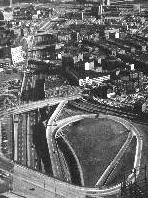
AMERICA: FROM THE BUS
"Crumbly parts, new shiny parts" -- The Mass Pike cuts Boston, heading under the Prudential Center; photo: Boston Architecture
|
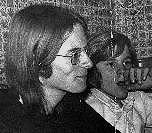 HOME AGAIN?
HOME AGAIN?
Not Ayer but West Boylston, on a Sept 1970 visit: Dad had lost the Battle of Hair even with boys still home, brother Mark right
I later wrote in my journal:
I was glad to get home. To Toronto.
|
All the way to Boston -- three hours along the Mohawk Trail, Route 2, passing the exit for Ayer -- I did. Back in Cambridge, recording that tale in my journal, August 24, 9:16 pm, I wrote I was crying still. All the way, I don't think I'd stopped.
"What the hell kind of a country is this," I wrote, "that I am forced to make such a decision?" But I knew. I had pondered it on an earlier bus ride, in June, from Boston to Ayer, the route "almost a cross section of America."
-
"We start in a city, seeing crumbly parts and new shiny parts. We roll along a super highway, a turnpike, through a small city, a fairly rich one [it was Newton].We go through a monstrous interchange onto another super highway, past all the [Route] 128 clean industry: IBM, Itek, Honeywell, Xerox, Polaroid, Sylvania, Control Data; the industrial half of the military industrial complex.
"Then off science row [onto Route 2] into the quiet little New England villages, the towns where the American Revolution started, and where now counter revolution is quietly supported. Then into more rural area, farmland, woods, but still held by the magnet of the city. Then off the highway, into the other half of the MIC, New England's biggest Army base [Fort Devens] and from there into the little town that is its whore, Ayer.
"That is the essence, that fort, and those industries: do they serve us, or do we serve them? Guess. The answer is easy. After all, when did the American people ever ask to be defended by plague, anthrax, and nerve gas?"
And yet, every day on the train, I'd also been able to gaze out over Walden Pond. Thoreau, Emerson, the Alcotts; they too were part of that essence. If growing up American was an accident of birth, it was a lucky one. I'd written in June:
- "I don't love America. I know better than to love any political unit, even Canada. People and small places, fields and trees and the sun, cities perhaps, or parts of them. I can love these. But nations are artificial and transitory. I have seen patriotism and what it can do. I intend to avoid it."
I did. If not avoiding love. Of cities, one in particular, much more than "perhaps"; even of Canada. That can be embarrassing to say -- proving I have indeed become Canadian. We're often inclined to see our "political unit" as, somehow, "artificial and transitory." Too often: it's not. But pondering it that way is precisely what frees us to see what else "patriotism" (if rarely called that here) can do.
Had I not grown up American I might not know that. At least, not quite so well.
"You can never go home again," as Thomas Wolfe titled one novel (another, Look Homeward, Angel, he first called Lost). It's true. Not because you can't literally go back (I can, and have a few times; I was never drafted), but because, when you get there -- even if it's not Gertrude Stein's Oakland -- "there" isn't there anymore.
I first realized this in 1987, with my brother Bill in a McDonald's on Ayer's rotary circle. It was new (we'd had to drive to Fitchburg, I think, for 15 cent burgers), as was the Pepsi canning plant nestled in the woods nearby. Looking at the kids behind the counter I thought: "They're growing up in the same town I did."
But they weren't. That town, that time, was gone. This place, superficially the same, was someplace else entirely.
For years I could wonder if "Ayer, Massachusetts" still existed, even if it ever really had. Scanning an atlas I'd feel almost relieved: up northwest of Boston; yes, there it is: Ayer. An entry in my journal -- the same June 1969 one where I pondered the essence of America by bus -- tells me I'd had that sense before.
-
"Strange -- on that bus I was thinking about Ayer, the name and the place, and I almost felt like I had better write it down somewhere so I wouldn't forget it. As if I could. But for some reason I felt I could, all too easily.
"A Y E R. It's such a strange name."
Maybe lost homes often feel unreal. I'd be reminded of it in Toronto on sails along the Queen Elizabeth Way, past a huge white box labeled: "Ayer Storage." So, I'd say, maybe that's where it is, for me anyway. In storage.
In fact some of it was -- in one of 14 bankers' boxes in my bedroom, where my whole life's record is stored, destined some day for the Canadian Lesbian and Gay Archives. All but that one, the only one predating 1969; a note inside says it's to go to my mother. I rarely dig in it. Lately, as you've seen, I have.
That 1987 trip was, I thought then, my last. In 1988 I discovered I had HIV, creating potential hassles at the US border and, possibly, odd dynamics as a lone "Person With AIDS" back in the bosom of "family."
After that I wanted them to visit me -- here: to see my life, my friends, the support I could count on in Toronto. At various times Deb and her boys, Brian and Joanne, my mother and father, all did. (Bill, Gary, and Mark had each been up in the early '70s.)
But beyond that: I didn't need to "go home" anymore: the place had lost all hold on me. Home, as I'd known it there, was gone.
I have recurring dreams of missing planes, though I never have -- always planes meant to take me home. A friend, new, young and American, a grad student here from Iowa, said when I told him that: "You mean Boston?" "No," I said. "Toronto."
But I did go back. On the afternoon of August 26, 1997 my brother Gary called from L.A. My parents had been in a car crash: "Mum's okay," he said, "but Dad didn't make it." They had planned a drive up to Toronto just the next week.
My friend Kevin Orr was with me that afternoon, on a visit from London; I'm glad he was, and not just for his gift of a quick airline ticket to Boston. I stuffed a few day's worth of AZT in my pocket and hoped for the best at US Customs; they didn't even check my bag.
That trip back, 28 years after I'd first left, allowed me -- as Virginia Woolf said of her parents after writing To The Lighthouse -- to lay them to rest in my mind. My father, I mean; my mother is still fine.
And, oddly (well maybe not; I hardly need dig up the ramifications of "Father"), it laid to rest in my mind, as well, the United States of America.
 FLYING UP; FACING BACK
FLYING UP; FACING BACK
AMEX: The American Expatriate in Canada (1969-1977); detail from its Oct/Nov 1970 cover, Miss Liberty's thought: "Well, there goes Flight 620 to Toronto ... I wonder if there's work for a girl like me in Canada!" |
Or thought I had. Back home (in Toronto), September 12, 1997, I wrote about it to Jane Rule.
-
"I was glad to be able to say [to my Aunt Alice and Uncle Jerry] that Ayer looked not run down, as they often fear, but taken care of. New lamp standards and sidewalks, banners reading 'Ayer, 1871,' a new and very in keeping addition to the classic little library, a place I knew well.
"We drove around Fort Devens, now an Army base in aspic: perfectly preserved pending civilian development but almost completely abandoned, the gates still there but open, no guards. Imagine. More than 20,000 people used to live there. We saw three. Ayer High School, consequently, now has graduating classes of about 40. In 1967, I was one of 200.
"You may be glad to know that the Nashoba Club is still there; the big sign over its door still reads 'Pizza.'
"I was more taken with the part of the state where the local siblings live now. Town line signs in the Commonwealth, you may recall, show the year of founding: Ipswich, Rowley, Newbury, all in the 1630s; Newburyport (I suppose as Newbury's port) in the 18th century but still well in time for the Revolution.
"We drove there on Tuesday, Joanne, Gary, cousin Glenn, my mother and myself, and walked around, sat by the water -- not the sea but the wide estuary of the Merrimack River, a place I'd never imagined and, had I, would not have imagined beautiful. But it was -- if a bit tarted up, tourism an economic force now, not shipbuilding.
"Even the big white flagpole with an eagle on top, flying a sewn (not printed), correctly proportioned Old Glory (3 by 5, not 1 by 2; the wind catches it differently) seemed exactly right to me. I'd never cared to see the USA again but seeing it, being in it -- or this part of it, anyway -- felt just fine. ...
"Coming back, I had nothing to declare (if you don't count a roll of Necco Wafers, which I can't get here [I've found them since]); an official looked at my passport and said, 'Welcome home, young fella.' Maybe I didn't look my age, being with family, I've often felt, returning one to the status of child."

|
DAD
Detail of a collage Gary made just after Dad died. From top centre (if not easy to make out): their wedding; leaning on house (9 Birch) & truck (Home Kleen); with his sisters; his father & surviving brothers; my mother; & named Man of the Year -- framing the GI Mum met in 1948 |
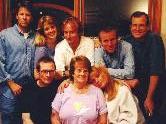
|
ELLIE & HER BROOD
Together for the first time in maybe 20 years, Dad gone: Gary, Joanne, Bill, Mark, Brian, me, Mum, & Deb |
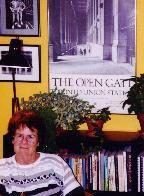 MUM AT MY PLACE
MUM AT MY PLACE
On a 1998 visit to Toronto with Joanne & husband Mike -- maybe feeling, as ever, in the kids' shadow... |
|
NEW BROOD
Plus: Debi's Sean, Michael & Michael Francis (not a grandchild by blood but as good as one), handsome 20-something boys. And Joanne's Maxwell, just born. So, not quite 36 -- but hey, it ain't the '50s anymore.
|
- "As it turned out it was easy. He more or less knew, and when he saw that he couldn't get me into UVM [University of Vermont, his Bennington employer not having the clout he'd thought with the governor], he said, whatever I decided he'd go along with."
I doubt it was that easy, for my father -- even though he knew kids were for letting go. Sometimes, emotionally, let go too early: he was not a man born to raise seven kids. His kids, and their mother, would agree. But he did.
It was only later, after I turned 21 -- older than he'd been when I was born -- that I seriously pondered a fact I'd glossed over in 1969: He could have stopped me. I was not, at 19, free of parental authority. But he didn't.
He was not unaware of what I so desperately wanted to leave. I didn't see that then, saw him as just one more smug American, a moderate success made of his hillbilly past. He liked to go off hunting, dead deer hanging from front yard maples a mark of prowess. We had guns in the house of course, shotguns, rifles, if no handguns. I learned to shoot but was never good at it, more comfortable cleaning guns. Or squirrels, already dead; skinning them and rabbits too.
He liked better hanging out with the boys at the Hotel Lincoln than with his brood on Pearl Street; there, nowhere better than in his big blue recliner, ordering one of us to go get him a beer. He played guitar, Country & Western; sang, wrote songs of his own. Free of all his kids at last he'd move Ellie to a trailer park in New Hampshire -- "Live Free or Die" -- free in particular of gun control in Massachusetts, strictest in the nation.
Yet, years later, one of his songs would be a scathing (and funny) attack on, and called, "Ronnie Reagan." My mother has it, and many more, on tapes Bill made.
When my father and mother visited in 1989, they saw many friends (I'd been lonely for maybe a week), the AIDS Committee where I worked, my doctors, the vast Sunnybrook Health Sciences Centre -- behind all that Canada's system of free universal health care. I wanted them to know I was well taken care of: they had just come from burying my father's father in Chester, West Virginia.
I was living then smack at Church and Wellesley, Toronto's gay downtown. My father got it right away (the neighbourhood I mean; he'd got that I was gay in 1972). The three of us talked one night about a childhood friend of his -- I'd known him as a Fort Devens drill sergeant -- whose uncle had been a hairdresser in Chester. Everyone knew; nobody much cared.
In 1992 I took them to Ottawa, embarrassing them (my mother especially, if a bit thrilled too) with a room at the grand Chateau Laurier. Standing on Parliament Hill for a sound and light show on Canadian history, it was my father, not I right away, who stood at the first strains of "O Canada." The next day, at the Changing of the Guard, his hat came off instantly for "God Save the Queen."
The last place I ever saw my father alive was Ottawa: he and my mother heading up the ramp from the Chateau's indoor garage, on their way home.
On that 1997 trip, we buried him -- figuratively. His ashes, not yet delivered, would be taken by some of the kids up a mountain in New Hampshire, poured in a crack of granite, his orange hunting hat stuffed in too. Brian had gone hunting with him; he knew the way.
Visiting my Aunt Alice in Ayer, she said to me: "You should have heard him talk about all of you!" -- his kids, proud of us. If rarely letting on to us; a reticence perhaps explained in part by what, Alice told me, he'd always say after singing our praises: "No thanks to me."
One night before I left, all those kids (together for the first time, I guessed, in 20 years) sat in my sister Joanne's living room, around our mother, and belted out Tammy Wynette's "Stand by Your Man." My mother was amazed we all knew the words. But we had grown up with them. So had she. And she had done it.
She had nearly died in that New Hampshire trailer park: of boredom. (At least when Dick wasn't there; late in life he'd worked in a bookstore, then drove around a truck full of flowers. They'd seen rough times, as parents, as husband and wife. But in the end, I sense, they were as crazy for each other as they'd been in 1948.) Now she's been to Austria, Spain, Morocco.
Five of her kids, independently, have stood under the Eiffel Tower. None, though, has been where she plans to go next. "The kids seem surprised when I tell them," she said once on the phone (calling me every weekend). "Why? Where is it?" "Australia."
And New Zealand. I was surprised. (She recently told me that that's off, planning instead a trip to Scotland.)
"No thanks to me," my father said of his kids' lives. Well Dad, I'm not so sure. I could never imagine raising kids. A friend of mine once said he couldn't either: "My heart would always be in my throat."
On a visit back to my grandfather not long before he died in 1980, age 85, still in the house my mother, and I, had known as children, I wandered into the "parlor." Like many such rooms it was neat, not often used, and full of things. Mostly pictures.
Formal portraits (high school ones of his eight kids: a mark of pride, high school; Dexter went on to Harvard, and many more kids) to snaps -- all over, all family -- from my grandfather's father to his grandchildren (36 by the time he died), even a few great grandchildren.
Endless kids. Endless diapers, baby bottles, chicken pox, groceries, school clothes. Endless bills. And, often if maybe not endlessly, that clutch of the heart in the throat.
I realized that raising kids had been their lives' true work -- all their other work, no matter their hopes or skills, little more than a job to finance that huge and vital task. So unlike my own work, and life. I could never have done it. I'm so glad I did not.
But in that room, part of it really, I stood in awe that they had. Some, all of them in a way, still do.
My life is not like theirs. Nearly not at all. I don't even live in the same country, resident in Canada more than ten years longer than in the USA; a Canadian citizen more than half my life.
As such, I see much of American life -- unavoidably; it's in our face all the time, on TV, in magazines crowding our newsstands, in the "global" economy and "global" pop culture we and the whole world feed on every day, nearly all of it Made in the USA -- as a force against which I must defend myself, my country; any other country's or people's own rich, distinct, even unique ways of living.
And I do: standing on guard, as we promise in "O Canada" -- even as most of us don't. But, now, I stand too in more considered respect. Of that land I left, those people I left behind, those lives I don't know anymore.
Not really; no more than they know mine. On the phone with my mother, I get all but the most local of her political and cultural references. I don't expect her to get mine. Apart from moments that seem -- to me, here -- of pressing import, I rarely even mention them.
A few do break through the American media sound barrier. My brother Bill called on the day Pierre Trudeau died -- news likely come and gone there in a day. Here: five days, intense, our typically subdued grief becoming, as one commentator put it, "the single most sustained public moment in the nation's history."
This nation. Some US reporters "got it" only when a Canadian colleague told them: "He was our Kennedy." Not exactly: a bit more nuanced than that, as Trudeau was; as things ever are in this odd country. But I suppose it was worth a try.
Mostly, with my mother, I don't try. There's no point really. She doesn't have to "get it." My world is not hers; her world, her life, not mine. It can take children too long to learn that their parents have lives of their own; did before the kids, even during, and will after. It's not, finally, all about you.
Or me. It took me nearly 30 years to see it.
Mark Kingwell, in Better Living: In Pursuit of Happiness from Plato to Prozac, offers up varied definitions of "happiness" -- even some, he admits, risking "fatal wryness."
I am lucky enough to meet at least one. It's from that famous comedian who once played God: George Burns. Happiness, he said, "is having a large, loving, close knit family -- in another city."
In my case a few cities: from Boston (well, Somerville) to, for a while, Santa Fe; Miami (now L.A., Pacific Palisades). Small towns too: Amesbury and Bradford and Ipswich, Massachusetts; once towns in Alaska and Oregon if now Parrottsville, Tennessee. I have nieces and nephews in some of those American places whom I've seen only in snapshots.
They look great kids, smart and strong. I wish them more than well. From here. If knowing something of there.
I am thankful for my American Education. Particularly for having got it from what I regard, still, as the very best of America.
All the best, to those kids. And many more. Everywhere.
Go to Punditry: At seventeen
Go back to An American Education / Introduction
Go to Promiscuous Affections: A Life in The Bar, 1969-2000
This page: http://www.rbebout.com/me/leaving.htm
February 2001 / Last revised: October 21, 2001
Rick Bébout © 2001 / rick@rbebout.com
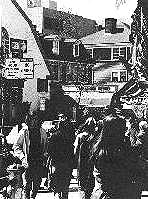 HOME AWAY FROM HOME
HOME AWAY FROM HOME

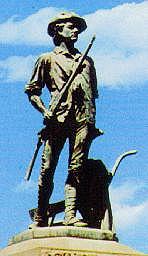
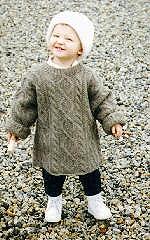 DEVIN BEBOUT
DEVIN BEBOUT
 JACKSON MAINO
JACKSON MAINO
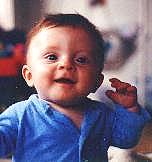 LACHLIN BEBOUT
LACHLIN BEBOUT
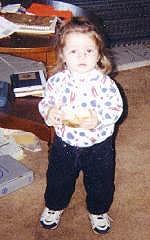 OONA BEBOUT
OONA BEBOUT